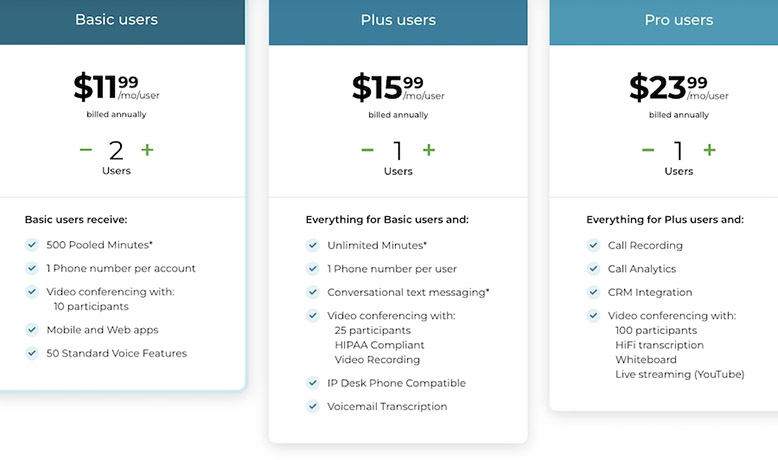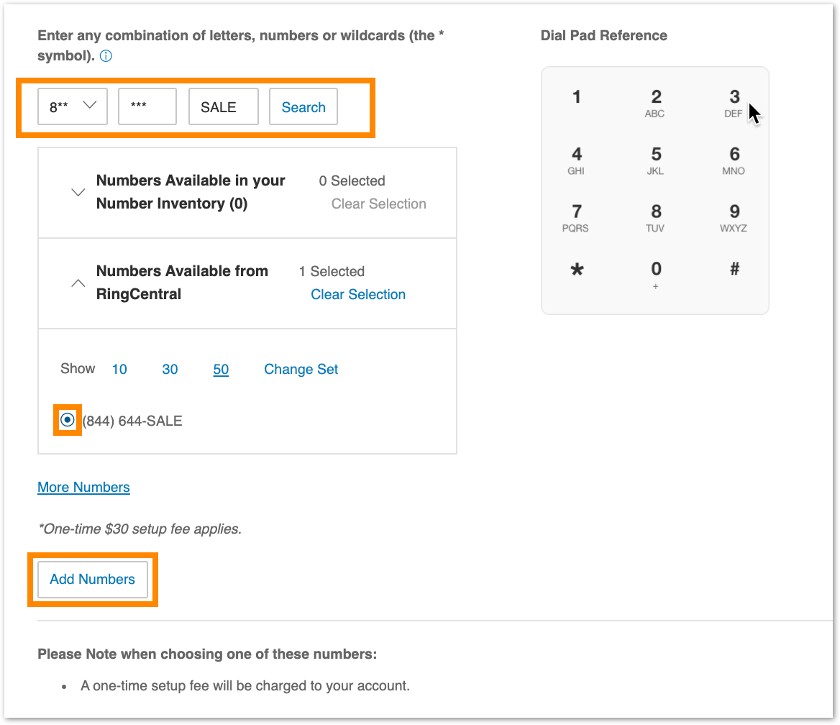The average cost of a cloud-hosted voice-over-internet-protocol (VoIP) service ranges from $15 to $60 per user on a monthly basis. Other fees add to your VoIP expenses in the form of metered calls, types of phone numbers, number of users registered, premium call features (add-ons), hardware, and internet plan. In this guide, we’ll explore how much VoIP services cost based on your unique business requirements and budget.
VoIP Costs at a Glance
The cost of VoIP varies significantly depending on the type of service provider and additional features you opt for. The comparison table below shows the starting price of VoIP service, additional paid features, and cost frequency.
Cost | Cost Frequency | |
|---|---|---|
VoIP Costs per User | Free to over $60 | Monthly, quarterly, bi-annually, or annually |
Additional phone numbers | $5 to $20 | Monthly |
Metered Calling | Varies by provider and country, starting at one cent per minute | Pay-as-you-go or paid add-on |
Add-ons | Varies by type of feature, starting at $5 | Monthly or annually |
VoIP Hardware (Desk Phone, Headset, Adapter) | Starts at $40 per unit | One-time fee |
Internet Subscription | Starts at $49.99 | Monthly |
The cost of a VoIP phone service is divided into two stages—installation and post-installation stage. Below we will discuss all the associated costs from installation to the ongoing prices of post-installation.
Costs to Consider in the Installation Stage
Generally, moving to cloud-based phone service is almost completely free. It only depends on whether the provider charges a setup fee and a one-time onboarding fee. The main factors affecting installation costs are the internet service upgrades and whether you need to purchase VoIP equipment.
1. Internet Service
VoIP services offer a high uptime with a service level agreement. However, don’t underestimate the importance of your internet connection when it comes to VoIP call quality. This is especially true if your company frequently engages in heavy internet usage (i.e., video meetings and streaming).
A slow internet connection results in poor audio quality and dropped calls, so you have to check your team’s active usage and adjust your internet bandwidth accordingly. In this case, it’s important to perform a VoIP speed test first to see if your internet connection supports the required VoIP speed requirements.
Consult your internet service provider (ISP) to learn the pricing for higher-tier packages with more speed or dedicated internet lines. At the same time, make sure your modem, router, and Ethernet cables can handle the additional workload of VoIP.
2. VoIP Hardware
Cloud-based phone systems require virtually no equipment since it works on any computer or mobile device. But if you’re looking to enhance the VoIP experience, invest in additional equipment like desk phones, adapters, and headsets. VoIP phone costs range from as low as $60 to as high as $1,000 or more, depending on the features. Popular brands are Polycom, Yealink, Cisco, and Grandstream.
The table below shows the estimated cost for each type of VoIP hardware:
VoIP Hardware | Purchase Price | Our Top Picks |
|---|---|---|
Internet Protocol (IP) Desk Phone | $90 to $650 | |
Headset | $40 to $450 | |
Conference Phone | $170 to $1,300 | |
Adapter | $45 to $850 |
Most VoIP providers like RingCentral allow users to rent or directly purchase VoIP equipment. When calculating your total VoIP expenses, consider how many VoIP phones, headsets, or adapters your company needs. This will give you a good idea of your initial investment.
Costs to Consider in the Post-installation Stage
As a cloud-based service, VoIP services are subscription-based. Regular fees apply, which can be billed monthly, quarterly, bi-annually, or annually. Once your VoIP system is installed and configured, it’s important to pay attention to the service costs during this stage.
3. Monthly Provider Charge
The majority of your VoIP initial investment goes to your monthly provider charge. On average, a VoIP line costs from $15 to over $60 per user, per month, depending on the provider and pricing model used. This usually includes unlimited local calls and basic voice features like auto-attendant, caller ID, call forwarding, and voicemail.
Most cloud-hosted solutions use a tiered pricing structure that bills per user. Others charge a la carte for each of the features you need, while some offer a flat fee for a certain number of lines and extensions. For cost savings, pay annually or register multiple users to get discounts. Our comparison table shows how much VoIP costs among the top providers in the market.
VoIP Provider | Monthly Starting Price (per User) | Key Features | Learn More |
|---|---|---|---|
$30 |
| ||
$30.95 |
| ||
$28 |
| ||
$34 for unlimited users |
| ||
$14.99 |
| ||
$19.95 |
| ||
$19.99 |
| ||
Not what you’re looking for? Check out our guide on the 6 best cheap VoIP services for budget-friendly needs.
4. Number of Users
Many business phone systems charge per-user fees billed monthly or annually. Each user receives a voicemail box, a dedicated phone number (local or toll-free), and access to an online portal for configuration. In most cases, the employee can forward calls to multiple devices and answer calls to other business lines.
Pro tip: Reduce your per-user price by choosing a provider that offers mix-and-match plans, like Phone.com and 8×8. These platforms let you pick lower-priced subscriptions for staff needing basic features and higher-tier versions for supervisors.

Phone.com allows you to combine different plans to match specific needs. (Source: Phone.com)
Alternatively, virtual number providers like Grasshopper don’t charge per-user fees. Instead, you pay a flat monthly rate for unlimited users. Your team will share the phone numbers and set up extensions. Flat-fee virtual phone service costs less for companies looking for unlimited domestic calling than full-fledged VoIP systems. If you’re a solopreneur needing only one business phone number, a free Google Voice line may do the trick.
5. Phone Numbers
Many VoIP services include one or more business phone numbers. Others offer it for free (with complimentary toll-free minutes), while some include it in your monthly plan. Depending on the provider, specific number types may cost extra, such as international, vanity, and toll-free numbers.

RingCentral lets you create a custom phone number through your online account.
(Source: RingCentral)
For additional phone numbers, prices vary by provider and number type and generally range from $5 to $10 per number, per month. Plus, some VoIP services charge a one-time fee for vanity numbers.
Number porting is free for most VoIP providers, while others charge $15 to $25. Make sure to factor in the cost of keeping your existing phone service until the porting process finishes, which ranges from five to more than 30 business days. During this time, you’ll need to pay for the new VoIP service and your current service.
6. International Calling
International call pricing varies by provider and the location you’re calling. There are two options: metered and unlimited call plans. A metered call plan charges per minute of usage, which is ideal for companies making minimal calls overseas. For those expanding and making more international calls, a service with unlimited international calling or add-on global calling plans is recommended.
Providers like RingCentral and Nextiva extend unlimited calling to Canada, whereas Ooma also includes free calls to Mexico and Puerto Rico. Certain providers only offer unlimited calling within the continental U.S., excluding calls to Alaska and Hawaii. Consider 8×8 and GoTo Connect if you need unlimited international calling. However, some VoIP providers, like Phone.com, require a $200 fee to enable international calling.
Companies with low call volumes can reduce per-user VoIP costs by bundling their users into a pay-as-you-go VoIP plan based on minutes per month.
7. Add-ons
VoIP providers allow users to extend the functionality of their VoIP service by adding extra features to their plans without the need to upgrade to advanced tiers. Depending on the provider, add-on features may include international calling, live receptionist, call recording, and advanced collaboration tools. Pricing depends on the type of add-on feature, but users are required to contact the sales team for a quotation.
Frequently Asked Questions (FAQs)
How does VoIP pricing compare to a landline service?
Unlike landlines, VoIP is usually cheaper because it doesn’t require the costly upfront fees for hardware, installation, and maintenance of an on-premise phone system. A monthly subscription for VoIP costs from $10 to $60, while landline ranges from $50 to $75, excluding setup fees. Find out which option works best for your business in our VoIP vs landline guide.
Can I make free calls with VoIP?
Unlimited calling plans let you make free calls over the Internet, but most business subscriptions for more than one person cost money. If you’re a solopreneur, make calls for free with Google Voice or use a solution like Ooma, which requires a one-time fee to purchase an Ooma Telo and then provides free, unlimited VoIP calls.
Do VoIP providers charge extra for technical support?
The majority of VoIP providers allow users to get help from their technical support team for free. The management and maintenance of a cloud-hosted VoIP system fall on the service provider, not its users. This includes software updates, so users don’t have to worry about dealing with technical details.
Bottom Line
VoIP costs vary based on the service provider, subscription plan, and the number of users. Unlimited calling packages cost more than metered services, and advanced features may require a higher-tier subscription. Outside of monthly charges, you may want to upgrade your internet service and purchase compatible VoIP devices for a better calling experience.
Now that you know how much VoIP costs, find the best option for your business by assessing your needs, comparing multiple providers and plans, and reading the fine print for hidden costs.